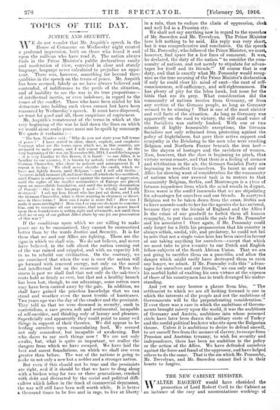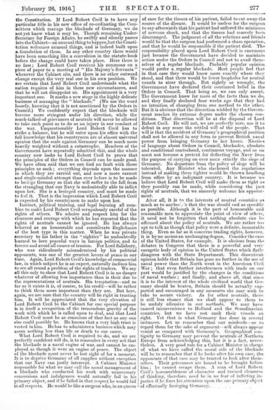THE NEW CABINET MINISTER.
WALTER BAGEHOT would have cherished the promotion of Lord Robert Cecil to the Cabinet as an instance of the easy and unostentatious workings of the C-onstitution. If Lord Robert Cecil- is to have any particular title in his new office of co-ordinating the Com- mittees which manage the blockade of Germany, we .do not yet know what-it may be. Though remaining Under- Secretary for Foreign Affairs, he swiftly and silently passes into the Cabinet—an unusual thing to happen,but the Consti- tution welcomes unusual things, and is indeed built upon ',foundation of them. In any other country there would have been something like -a convulsion in the statute-book before the change could have taken place. Here there is no iuss ; Lord Robert Cecil receives his summons on a piece of paper to a meeting of " His Majesty's Servants " whenever the Cabinet sits, and there is no other outward change except the very real one in his own position. We are certain that Lord Robert Cecil understands what the nation requires of him in these new circumstances, and that he will not disappoint us. His appointment is a very important one. It marks a new stage in the highly delicate business of managing the " blockade." (We use the word loosely, knowing that it is not sanctioned by the Orders in Council.) We confidently expect that the blockade will become more stringent under his direction, while the much-talked-of grievances of neutrals will never be allowed to take such point as to do us an injury in our conduct of the war. Unquestionably Lord Robert Cecil has to strike a balance, but he will enter upon his office with the full knowledge that his countrymen are of almost universal opinion that the scale against Germany can be much more heavily weighted without a catastrophe. Members of the Government have repeatedly admitted this, and the whole country now looks to Lord Robert Cecil to prove that the principles of the Orders in Council can be made good. We have often said that we can find no fault with those principles as such ; everything depends upon the manner in which they are carried out, and now a more earnest and single-minded attempt than ever before is to be made to bedsge Germany so that she will suffer to the full from the strangling that our Navy is undoubtedly able to inflict upon her. She is a besieged, country, and must be made to feel it. That is the impression which Lord Robert Cecil is expected by his countrymen- to make upon her. Instinct, political training, and legal learning all com- bine to make Lord Robert Cecil scrupulously careful of the rights of others. We admire and respect him for the clearness and courage with which he has repeated that the rights of neutrals cannot be ignored. He has always behaved as an honourable and considerate Englishman of the best type in this matter. When he was private secretary to his father in the "eighties" he undoubtedly learned to love peaceful ways in foreign politics, and to foresee and avoid all causes of tension. For Lord Salisbury, who was ridiculously misunderstood . by his political opponents, was one of the greatest lovers of peace in our time.. - Again, Lord Robert Cecil's knowledge of commercial law, in which subject he is an expert, naturally inclines him to see all round a problem of the rights of traders. We say all this only to show that Lord Robert Cecil is in no danger whatever of allowing less importance than is their due to the representations of neutrals. His temptation—and so far as it exists it is, of course, to his credit—will be rather to think them more, important than they are. But here, again, we are sure that the country will be right in trusting him. It will be appreciated that the very elevation of Lord Robert Cecil to the Cabinet for one special purpose is in itself a recognition of the tremendous gravity of the work with which he is called upon to deal, and that Lord Robert Cecil must be as conscious of that fact as any one else could possibly be. He knows that a very high trust is vested in him. He has to administer a business which may mean nothing less than life or death to our cause. What Lord Robert Cecil is required to do, and we are perfectly confident will do, is to remember in every act that the blockade is a naval engine of war, and cannot be em- ployed as though it were an engine of peace. The object of the blockade must never be lost sight of for a moment. It is to deprive Germany of all supplies without exception that our Navy can justly intercept. • A Cabinet Minister responsible for what, we may call the moral management of a blockade who conducted his work with unnecessary concessions and indulgences would naturally fail in his primary object, and if he failed in that respect he would fail mall respects. He would be like a surgeon who, in an excess of care for the tissues of his patient, failed to cut away the source of the disease. It would be useless for the surgeon to say afterwards that his patient had sOffered the minimum of nervous shock, and that the tissues had scarcely been disarranged. The judgment of all the relations and friends would be that the surgeon had performed a sham operation, and that he would be responsible if the patient died. The responsibility placed upon Lord Robert Cecil is enormous just because the Government have decided to maintain action under the Orders in Council and not to avail them- selves of a regular blockade. Probably popular opinion would prefer a ,regular blockade. Most people feel that in that case they would know more exactly where they stood, and that there would be fewer loopholes for neutral vessels to steer through. But rightly or wrongly, the Government have declared their continued belief in the Orders in Council. That being so, we can only assent. The Government know far more of the facts than we do, and they finally declared four weeks ago that they hid no intention of changing from one method to the other. But it is obvious that the discretion wielded by the Govern- ment reaches its extreme degree under the chosen con- ditions. That discretion will be at the disposal of Lord. Robert Cecil. He will not, we are perfectly sure, use it to defeat in any sense the settled will of the people. That will is that the accident of Germany's geographical position shall not be allowed in any form to prevent British naval power from bringing Germany to her knees. Niceties of language about Orders in Council, blockades, absolute and conditional contraband, continuous voyage, and so on must not become a pretext for deflecting the Navy from the purpose of carrying on ever more strictly the siege of Germany. No departure from the policy of siege will be tolerated. Any Minister who slackened the regulations instead of making them tighter would be thrown headlong from office by an indignant country. It is because we believe that Lord Robert Cecil will make them as tight as they possibly can be made, while considering the just rights of neutrals, that we sincerely welcome his appoint- ment.
After all, it is to the interests of neutral countries as much as to anyboi;y's that the war should end as speedily as possible. Although it is the part of honourable and reasonable men to appreciate the point of view of others, it need not be forgotten that nothing absolute can be affirmed about the policy of neutrals. We are rather too apt to talk as though that policy were a definite, immutable thing. Even so far as it concerns trading rights, however, it is by no means an unchanging dogma. Consider the case of the United States, for example. It is obvious from the debates in Congress that there is a powerful and very energetic body of opinion in the United States which flatly disagrees with the State Department. This dissentient • opinion holds that Britain has gone no further in the use of naval power than the North went in the American Civil War ; that even further interferences with, trade on our part would be justified by the changes in the conditions of naval warfare ; and finally, and above all, that since it is to the interest of the whole civilized world that Ger- many should be beaten, Britain should be actually. sup- ported and encouraged in any measures she .may wish to take to secure victory. As for other neutrili, there is still less chance that we shall appear to them to be unduly offensive in our methods. We may have caused inconvenience to Holland and the Scandinavian countries, but we have not - sunk their vessels at sight. Yet that is what Germany' has done in several instances. Let us remember that our . misdeeds—so to regard them for the sake of argument—will always appear venial as compared with Germany's. Geographical con- tiguity to Germany may prevent the neutrals of Northern Europe from acknowledging this, but it is a fact, never- theless. A very good rule for a Cabinet Minister in charge of what we have called the, moral side of - the blockade will be to remember that if he looks after his own case, the opponents of that case may be trusted to look after thein- selves. Their grievances are bound to be brought before him ; he cannot escape them. A man of Lord Robert Cecil's honourableness of character and trained Clearness of thinking; therefore, need be in no fedr of inflicting in- justice if.be fixes his attention upon the one prinier), object of effectually besieging Gerniany. _



































 Previous page
Previous page